|
 " Welcome
to Caer Sidi... ! "
" Welcome
to Caer Sidi... ! "

Caer
Sidi is a unique experiential program which
includes introduction to both Tibetan Tsa-rLung and Celtic Shamanic
Healing in
selected powerplaces and allows participants to find
their own Keys to
Transmutation, Rejuvenation and (Self~) Healing, through
the Body of Light practices...
Caer Sidi is intended to re-awaken and develop a
synthesis of our latent roots shamanic
abilities. We will learn how to intentionally shift our state of consciousness,
link with Protectors and Holy Spirits, as well as how to get more awareness of
subtle non-ordinary reality, while opening and cleansing our Higher
Chakras.
Experiential
spontaneous transmissions of teaching and revelations from Masters, Angels or
Fairies, have always been a foundational
aspect of spiritual awakening in both the Tibetan Body of Light (Tsa-rLung)
lineages and related Arts of Divination, Rejuvenation and Healing in the Grail Quest.
Today Caer
Sidi acts as the Sacred Arts & Rituals (e-Learning)
Portal, with a summer curriculum based in the South
of France (Verdon) and a reseach and development training
center in Kathmandu, Nepal. We offer workshops and
lectures and perform Sacred Arts Rituals & Concerts around the
world.
Caer Sidi, The Fortress of the Fairies
is mentioned in the Book of Taliesin (Lewis Spence).
That Caer Sidi (Camelot) was the Seat of rituals and initiations for Healing and
Divination of an extraordinary vitality and importance to
the Celtic psyche is no new thesis . But that it can be
re-awakened today, simply through a comparative
experiential study of Grail
Lore and Himalayan Tantric Shamanism
is a testimony we want here to share with
you.
One of the Island of Crystal, or Caer Sidi, is the Celtic, Cathares, and Knights Templar sacred
archaeological Mandala situated at the entry of the Gorges du
Verdon, some 150 km northwest of Nice, South-of-France.
It was
the seat of rituals and initiations for healing and divination
practices, which originated from the Black Sea (Wisigoths and
Scythes Central Europe) and the Asian Steppes (Kelts and
Huns), and continued into early Celtic-Roman times and later
Holy Grail Mary Magdalene Lore.
The
word Sidhe
(also spelled Sidi, Sidh, Sid, Sith ...)
may be regarded as the standard term
for "fairy"
in the Gaelic tongue of Scotland , Wales and Ireland. While
some reliable authorities further stress that Sithide
or Sithde is the genitive of Sithd, a female
fairy, Gaelic records Sidhe as also implying "hill"
or "mound". Mounds and hills often are both graves and
abodes of the elves.


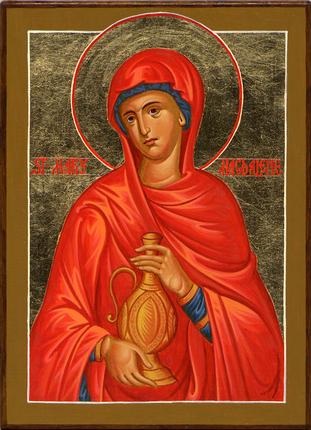
Join us in the only Keltic
Dharma & Magdalene Pilgrimage in existence till today,
with
Tibetan Yogis (gNakpas) Lamas
and Shamans Healers during
powerful retreats & journeys in to the sacredness of
Keltic spiritual heritage.
We invite you to be part of this
embodiment and catharsis experience, so to nurture and
reconnect with the Body of Light Healing and Rejuvenation part of
yourself, as well as with your Protectors (Archangels, Yidams,
Dakinis). Allow us to propose selected Sacred Rituals yoga,
ceremonies, healing, inspirational teachings and moments of powerful transformation,
awakening the power of your
heart chakra, under the guidance of professional certified
counsellors, lamas and healers....
The retreat
site is at the center of the Verdon Mandala, in a
staggering beautiful and powerful nature, and practices to honour such sacredness...
Sacred Arts & Rituals
CAER SIDI
Shamanic Healing, Sacred Arts and Rituals are based upon the
currently attempted synthesis of Shamanic Healing Practices
performed in the Verdon Sacred Mandala, from the Keltic (Magdalene Grail Lore), Tibetan Ngakpas
(Tarab, Dudjom,
Khyentse and Bon lineages) and the
Orishas (Aconcha, Santeria, Yorouba). It also draws
inspiration from non sectarian contemplation (Body of Light),
naturally self-arising embodiment (Tigle) and Sacred Arts &
Music.
Current Tibetan Dharma comprises in fact two main communities,
that of the well- known Sutra and Mantra practitioners,
shaven-headed monks from monasteries, and then that of the
less-known long-haired Yogis, the Ngakpas ...
This essay leads to the path of the Western Ngakpas in our
Modern World — the Injis yogis or yoginis, man or woman, who
where immersed, and recognized as their own, the imported
Tibetan Dharma. They live fully through the contradictions of
both the Western material world and the so-called Tibetan
world of spirits...
As Shaman Warriors, either as solitary wanderers or
integrating their spiritual wisdom with the activity of the
community, they dwell on the fringe of monastic
institutionalized religion, financial asserts and political
hierarchies, a sort of unique existential quest for a more
responsible, transparent and socially resonant spiritual
identity.
Sacred Art works is one of the valued skillful means (Upaya)
in terms of inspiring practitioners towards practice,
excellence and harmony. The practitioners of today,
particularly Ngakpas, find a personal calling to try to revive
many of these art traditions so that they increase rather than
fall into memories of the past.
In this sense, the present Introduction and training into the
Shamanic traditions of the Ngakpas, is not a simple
importation of yet another Tibetan system of hierarchy or
reference, but an integrated renewal approach to spirituality,
within daily life work, and as a path of personal
transformation.
We know that these unconsciousness levels and cultural aspects
are difficult to ‘see' because of their transparency, as such
are most of our modern rituals in society, and that as such
only experiential investigation could help understand the
illusory nature of political/cultural mainstream masking the
inner core Body of Light consciousness.
The archetypal deities of ancient Europe still exist in many
peoples' psyche or mind. The stripping away of neurotic
typology is the starting point. Therefore, Protectors Deity
yoga and the Cutting Through practice of Chöd are hereby
emphasized...
Core Shamanic methods may address everyday ailments, malaise,
depression, anxiety, addiction and behavioural issues that
cause concern, discomfort, pain and dysfunction for the
client. Many people have suffered past traumas, whether
mental, physical and/or emotional. These traumas affect our
energetic fields, the very essence of what connects our minds,
bodies and souls together.
On a more Hermeneutic (egregor) point of view, Core Shamanic
practices may also address powerplaces dysfunctions, restore
their energetic balance to their natural heritage
(pre-traumatized) state; restoring peace and access all
spiritual heritage sentient beings there residing (locus dei),
and scan the soul for embodiment...
Shamanic Healing practices works through spirit to facilitate
the restoration of an individual’s karmic energetic field.
The body/mind/spirit connection exists through the energetic
field and when that field is damaged due to trauma the
individual experiences significant power loss. The shamanic
practitioner consults with spirit to see and diagnose the
damaged areas of the energetic field and then formulates a
shamanic healing plan for the individual seeking restoration.
It is important to understand that in the practice of
shamanism the shamanic practitioner works in partnership with
his/her helping spirits. The helping spirits do the diagnosis
and advise the practitioner on what healing should be done and
which shamanic methods to use in the healing process.
In this sense, some recognized professional training in
counselling, clinical anthropology and/or developmental
interventions is clearly emphasized as the prior-requirement
for any healing practices to be considered.
The 'Incantations' thereupon preformed may present an unusual
form of musical and poetic shamanism; here Tibetan and Celtic
tunes meet Cuban folk melodies, here Grail Lore inspiration
poetry meets Thangkas aesthetics. Thus the listener dwells
through the labyrinth, facing the archetypes and archaic
sounds, that wake the primal image of the karmic worlds of
their soul. It is an naturally evolving unique combinations of
archaic world traditions and modern post-rock sound.
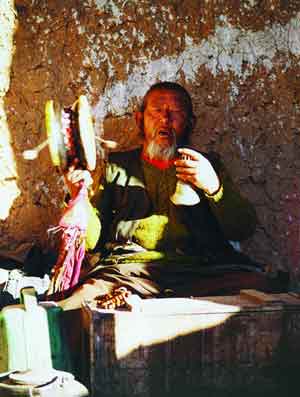
The demons of the
Tibetan chöd
rites are destroyers of the profane body in preparation for
rebuilding it as a Body of Light. The resulting method
of cleansing (which may be viewed as that of feeding our
demons, as based upon the principles of Tibetan Chod...) is a
simple enough archetypal catharsis practice, that does not
require necessarily any indepth knowledge of Tibetan
practices, per se.
Rather to the contrary, although based on the traditional
Tibetan practice of chöd (literally "to cut"), the
method here developed is practiced as a path to awareness to
the Grail Lore Heritage, there residing...
The (self-) healing practices of the Ngakpas Body of Light
yogas, Shamanism and Grail Lore are woven together in this
experiential pilgrimage. We will explore the
interconnectedness of our bodies, minds and spirits in a way
that is deeply supportive to each individual. The ritual of
Chod will comprise uniquely haunting, melodic chants, known to
heal physical, emotional and spiritual discord.
We may use Core Shamanic Methods of the lineages
considered in order to evaluate the selected target-sites,
residuals entities, enfolding karmic events and practitioners
in situ. The motivation is to promote awareness, compassion
and healing to those in needs.
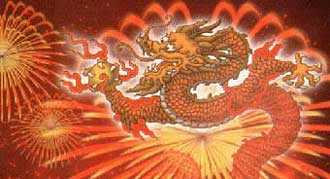
Termas
Secret Teasures
The Magdalene Tower visualization is broader in essence than
the Judeo-Christian heritage. In the Nyingma tradition of
Tibetan Buddhism, for instance, a fundamental source of
religious teaching is the Termas (secret treasures). Termas
include sacred texts composed anciently, primarily by the
great Guru Rinpoche (Padmasambhava) and hidden by him in
various secret locations to be discovered at a later date.
Termas can only be discovered by a special class of adepts
known as tertons (treasure finders). Only Tertons can reveal
these texts because they are written in the cryptic language
of the Dakinis …
The purpose of Termas had been for Guru Rinpoche to keep the
faith and practices on track by making clear the fundamental
“plain and precious” principles of the tradition. Further, it
is interesting to note that some of the Tibetan termas are
called “mind treasures” because they are not physically
discovered but are revealed through the mind of the Terton.”
What is interesting here is not to preposterously argue, but
to notice the similar mechanisms and to ponder on social and
intellectual dynamics and consequences that make them
effective. It is believed that students of Padmasambhava
reborn in later centuries would remember their earlier
incarnations through the vehicle of revealed treasures which
they spontaneously express through unique ways in their
lifetime. The Terma treasures are sometimes physical (texts,
amulets, relics), but frequently they are treasures of the
mind. In a broad understanding of the concept, one might say
that the excavation of European Keltic mummies in the deserts
of China and Mongolia may counts as clues why the common
Shamanic background of both the Keltic and Vajrayana
traditional practices heritage, may today linked the Terma
with the symbolic artifacts of the Grail Lore (Von Eschenbach).
Well-known Tibetan teacher, Namkhai Norbu, describes the
process, “as one of direct transmission from teacher to
student through the use of symbols” and describes the
‘language of the dakini’ as a form in which the ancient,
secret teachings are encoded until the time a certain
predestined people around the world will discover portions of
them, which it is their task to translate into the cultural
language of their time and place. To be a part of this lineage
does not require that the person be participating in a
particular spiritual form, such as belonging to any Tibetan
Buddhism Sectarian Lineage, although the teacher doing the
transmitting may well be Buddhist.
Tibetan Tulku, Thondup Rinpoche states : “Treasure-finders
known as Tertons (sometimes female terma-finders are referred
to as Kandroma, which basically means ‘dakini’) receive their
Termas in the language of the Dakini, which is a secret script
that has to be decoded. Terma-finders must have a consort with
whom to practice their mystical yoga.
‘The support of the consort has two purposes…to produce and
maintain the wisdom of the union of the great bliss and
emptiness (freedom), by which the adept attains the ultimate
state… (and) the consort causes him or her to awaken the
realization as well as to discover the Termas.
The ‘special consort who has made the appropriate aspirations
in the past” is “the key to accomplishment,’ which is ‘one of
the reasons why all Tertons happen to have consorts.
“Dakini is a Tibetan word meaning skydancer, or sky-walking
female,” and describes the embodiment of cosmic feminine
energy and wisdom. The narratives of the great Tibetan and
Indian ‘masters’ generally contain a segment in which the yogi
is awakened or initiated by a yogini or female guru, often
disguised as an ‘ordinary’ woman.
The dakini’s identity is ‘ambiguous’ and she is often not
recognized for who she is, even by advanced yogis. Dakinis
have to integrate the time and the place that they live in…
Tertons and Kandromas...express their discoveries through the
particular vernacular of their time and practices, “ritually
enacting their local system of myths and symbols and interpret
the patient’s condition within that system.
The key to this form of Alchemy is that one does not work
directly on the physical body, but instead projects the
etheric or subtle body in the form of a castle or tower and
works within the visualization of naturally self-arising light
visions (tigles).
These correlate to the different Sephirots or energy centers on
the Kabbala Tree of Life, which in turn correspond to the
chakras. After each practice, the subtle body is drawn back
into the physical.
Similar to the Buddhist concept of letting flow (letting go),
we will use such an indirect route to make the necessary
changes within the etheric body, so that the subconscious will
proceed to implement those alterations . . . as it continually
builds and maintains the physical body.
Sexually ecstatic states are celebrated literally as well as
symbolically in tantric and kundalini yoga, both of which
evolved out of North Asian shamanic practices. The Sanskrit
word tantra comes from the root tan, meaning ‘to stretch’ or
‘to weave.’ Tantra is the art of weaving together the
spiritual and the material worlds. It is a way of realizing
the divine essence through bodily experience, especially the
creative force of sexuality. The Sanskrit term Kundalini,
meaning “serpent power,” designates divine sexual energy...
During orgasm lovers often appear as if possessed by spirits,
shuddering and quivering, groaning and crying out, momentarily
blind and deaf to all that surrounds them. Scientists point to
a strong neurological connection between sexuality,
particularly female sexuality, and going into a trance.
The blending of sacred eroticism with ecstatic visionary
experience is not limited to Asia and points to once
“important role in Christianity,” quoting St. Theresa and the
“deeply ecstatic language of [other] Christian mystics.
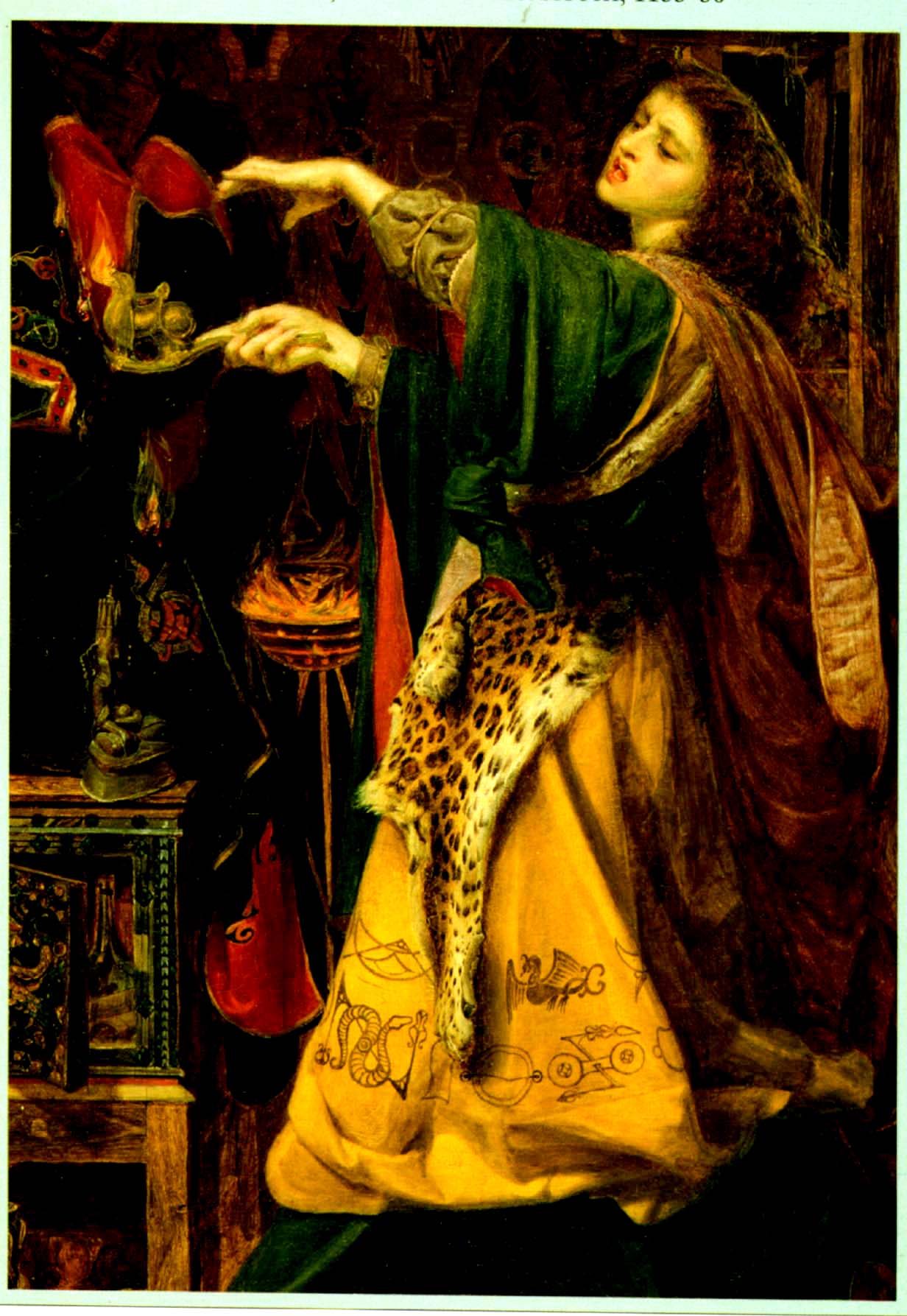
Morgane Le Fay,
Caer Sidi in Brittany
(Abbalach Bries)
Common Shamanic Roots
Recent evidence strongly suggests that there is a connection
from the Mediterranean Bronze Age yoginis and those historical
yoginis recorded two thousand years later in India and Tibet.
Eurasian mummies unearthed from burials in the Altai Mountains
of Mongolia and the Tien Shan Mountains of China have changed
our ideas regarding Bronze and Iron Age peoples, showing that
they traveled thousands of miles in their migrations and
shared cultural contacts that connected them all the way from
Turkey and Greece to Tibet, India, and the western edges of
China. Buddhist monasteries and temples were financed by
merchants engaged in active commerce along the Silk Road that
linked China to Rome. Female priestesses wearing high conical
black hats (like Russian “Babas” and European witches of the
Middle Ages) have been found in the Tarim Basin from the late
2nd millennium B.C. bringing to life the many enigmatic
textual references to “dakini witches” and “yogini queens” in
the later histories of pre-Buddhist Tibet that have only
recently become available in English.
The fundamental doctrine of the Gnostics relates the dualistic
nature of the world in which we reside, the eternal struggle
between good and evil. They believed that Jehovah, the
wrathful god of the Old Testament was a false god and
expression of what they called the demiurge. For how could a
fully enlightened divinity contain within him the base
emotions of anger, jealousy and vengeance? For them, the real
God was a loving deity equally and directly accessible to all.
This God taught that love, compassion and the true sacrifice
and transformation of the self, or ego, was the highest
spiritual path.
The Gnostics believed that the plan of this demiurge, or
Satan, was to trap spirit in matter, and the Earth itself was
a prison in which souls were exiled from their divine home.
For them, the real world was the non-material world of spirit
and all of their rituals and practices were designed to purify
them and provide them with the means to find their way out of
the impure world of matter, darkness and suffering and return
to their true home in the Light.
Clearly, these sacred esoteric teachings were revolutionary.
Unlike the fixed, restrictive, hierarchical systems prevalent
during this period, these teachings were open to all, female,
male, rich, poor Jew or Pagan. This all-inclusive transmission
of teachings formerly reserved for the elite was at odds with
the practices of Orthodox Judaism and the emerging Church of
Rome. For once the seeker had been touched by this Gnostic
current, she or he came to recognise their own divine nature
and perceive their place in the world from a whole new
perspective. No longer did they need the intercession of a
priest or rabbi to connect them with their spiritual
inheritance.
At the heart of this lineage of transmission was an
extraordinary metaphysical teaching known as Gnosticism. This
teaching is believed to be the spiritual basis of his
essential message to humanity, a message revealed to Mary
Magdalene, his disciples and followers through the vehicles of
metaphor, allegory and parable. Unlike the patriarchal,
dogmatic, materially based teachings prevalent during this
period, Gnosticism placed primary value on the feminine
qualities of receptivity, intuitive perception, visionary
experience and the art of healing. It was a teaching of love,
selflessness, harmony and communion.
The mystic experience of, and communion with, the essential
grace and majesty of Divinity, lay at the heart of this
Gnostic transmission. The clear and immediate experience of
this awakening was known as gnosis or wisdom. Often translated
from its Greek root as ‘knowledge’, Gnosticism goes much
deeper than mere intellectual understanding. Like a brilliant
flash of light arising from the darkness, this understanding
arises in the individual as a bright lucid awareness – an
intuitive realisation of the pure essence, nature and energy
of Divinity as it flows within oneself, the luminous realms
and all of creation.
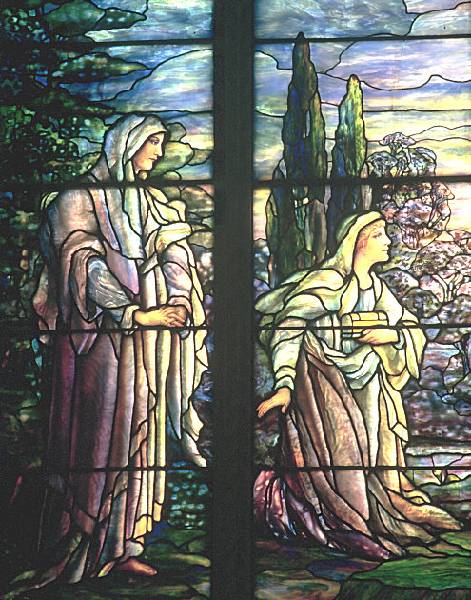
The Black Madonna is honored as a true Goddess figure, and has
been since Christianity entered Europe. She is honored by many
as Isis, Gaia, Kali, Mary, "the Other Mary" (Mary Magdalene),
Diana, Sheela Na Gig, and the Ancient Primal Earth-Mother
Goddess.
For many European Christians, the blending of their ancient
Goddesses with the Blessed Virgin Mary has been a well
accepted fact of their faith for centuries, there is no
conflict. The Black Madonna, be She called Isis, or Mary, or
Kali, or Diana, embodies all the aspects of Female Divinity
for many millions of people.
According to Helena Blavatsky in her book "Isis Unveiled" on
page 443 - Vol II, she states: The exoteric plan of the Bible
was made to answer also to four ages. Thus, they reckon the
Golden Age from Adam to Abraham; the silver, from Abraham to
David; copper, from David to the Captivity; thence-forward,
the iron. but the secret computation is quite different, and
does not vary at all from the zodiacal calculations of the
Brahmans. We are in the Iron Age, or Kali-Yuga, but it began
with Noah, the mythical ancestor of our race.
Noah, or Nuah, like all the euhemerized manifestations of the
Un-revealed One - Svayambhuva (from Svayambhu) - was androgyne.
Thus, in some instances, he belonged to the purely feminine
triad of the Chaldeans, known as "nuah, the universal Mother."
Every male triad had its feminine counterpart, one in
three, like the former. It was the passive complement of the
active principle, its reflection. In India, the male Trimurti
is reproduce in the Sakti-trimurti, the feminine; and in
Chaldea, Ana, belita, and Davkina answered to Anu, Bel, Nuah.
The former three resumed in one - Belita, were called:
"Sovereign goddess, lady of the nether abyss, mother of gods,
queen of the earth, queen of fecundity."
Western observers who are familiar with Hindu religious
customs have identified this ceremony with the Durga Pooja of
India In Romani, Kali Sara means Black Sara and in India, the
Goddess Kali is known as Kali/Durga/Sara.
Like the Hindus, the Roma practice shaktism, the worship of
Goddesses. In other words, the Roma who attend the pilgrimage
to Les Saintes Maries in France and in other related
ceremonies elsewhere honouring black female divinities, are in
fact continuing to worship Kali/Durga/Sara their original
Goddess in India.
According to the Durgasaptashati (seven hundred verses in the
worship of Goddess Durga and her various forms), chapter 5,
verse 12, which mentions Sara, contains the following: "Salute
to Durga, Durgapara, (Deliver of all difficulties), Sara,
(Embodiment of everything par-excellent), Cause of everything,
Krishna and Dhurma (Evaporated form in smoke)." Other
references in this ancient Hindu scripture also confirm that
Sara is one and the same with the Indian goddess Durga who is
also another aspect of Kali, the consort of Shiva.
The memory of Shiva himself has been preserved among the Roma
as O Baró Devél in Romani. Thus, the Roma pray to Kali Sara to
intercede with O Baro Devel to bring them luck, health and
prosperity. During the ceremony of the Durga Pooja in India
which takes place annually in October, a statue of Durga is
carried on a platform into a body of water and immersed which
destroys the statue. At Les Saintes Maries, the Roma do not
immerse the statue but otherwise the two ceremonies are so
similar that the similarity could not be accidental. In
France, a reduced Kali Sara ceremony also takes place in
October to complement the major festival of May.
The unexplained mystery is how the worship of Kali became
fused with the Black Madonna in the crypt at Arles. Most
likely there was always a Black Virgin at Les Saintes Maries
dating back to Pagan times, which later became incorporated
into Christianity. To explain the presence of this Black
Statue, the church may have simply invented the legend of
Sarah, the Egyptian servant of the Three Maries, now reduced
to two with the passing of time and the Church’s attitude
towards "sin.". In other words, there must have been multiple
overlays of the original Black Goddess whose name or names
have been lost. Many cultures and religions have existed in
the coastal region of Les Saintes Maries, perhaps Egyptians
and Cretans, but certainly Phoenicians, who founded the colony
of nearby Massalia (Marseilles), Gauls, Greeks, pre-Christian
Romans, Christian Romans and the ancestors of the present
population.
The Roma arrived early in the 15th century when
they would have been forced to hide their original Indian
beliefs and religious practices under a veneer of Christianity
to escape condemnation and persecution by the Mediaeval
Church, which began to root out heresy and witchcraft in the
15th century. To avoid charges of heresy and
witchcraft they must have found this loophole which allowed
them to continue to worship Kali in the guise of Sarah the
Egyptian.
King René d’Anjou of Provence was responsible for establishing
the cult of the Maries and of Sarah the Egyptian in the 15th
century. King René was reputedly the friend or lover of Joan
of Arc and narrowly escaped charges of heresy himself because
of his "pagan beliefs" and his founding of the Order of the
Crescent which the Church viewed as suspiciously Islamic and
also connected with the pagan worship of Isis. This was
considered unacceptable to the Church which at that time was
devoted to stamping out heresy. It was during his reign that
the remains of the four unidentifiable, decapitated skeletons
were discovered during excavations under the church. These
were assumed to be those of the Three Maries and Sarah, the
Egyptian. . This, however, conflicts with the bones found
later, in a box under the church in 1496, which are also
claimed to be those of Sarah the Egyptian servant of the
original three Maries. Bones are bones and could have belonged
to anybody including martyrs to some faith, Christian or
non-Christian, human sacrifices to some long forgotten God or
Gods, or even to some pious priestesses or temple virgins who
died after a lifetime of service to some long forgotten
Goddess. As far as is known, they have not been carbon tested
to establish the date of demise which might help to solve the
mystery.
Standard Christianity took a long time to become established
in the Provence region of France and this may have created a
refuge of tolerance where the Roma were able to worship Kali
Sara unmolested. This was the location of the Cathars and the
Albigenses, two Gnostic Christian groups who were mercilessly
persecuted by thugs, pillagers, arsonists, murderers and
rapists with an eye for loot masquerading under the guise of
"Crusaders" recruited and blessed by the Pope of the era under
the banner of Christ to wipe out "heresy" in the region.
But until today, many survivals of pre-Christian religions
survive in this area from the sacred white bulls and the
horses of Provence, another ancient pagan legacy perhaps
connected with the worship of Mithra, the tridents carried by
the Guardians, the bull herdsmen who escort the statues of the
Two Maries and of Kali Sara into the Mediterranean on May 24
and May 25 to the Black statue at Les Saintes Maries whose
confused and multi-layered identity has allowed the Roma to
worship Kali Sara in the guise of Saint Sarah while the
original Black Goddess herself has refused to die but has
suffered only many changes of names and identities with the
passing of time.
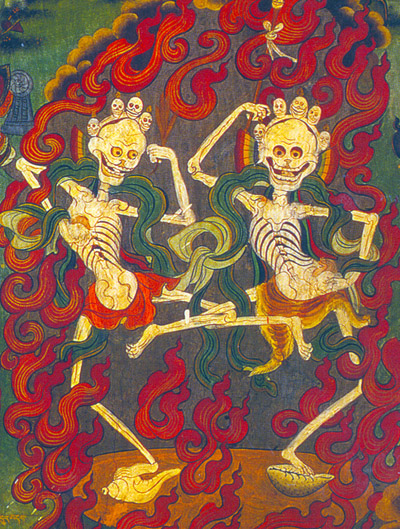
Shamanic Training may require many hours of experiential
learning, hands on practice and a life-long commitment to
continue the path and continue education, training and
practice.
The layout of such a stepwise experiential pedagogy could
enfold as follows:
Intro to Shamanism Class and Workshop
Intro to Shamanism Class and Soul Retrieval Workshop
Divination & Ancestral Clearing Workshop
Soul Retrieval Workshops
Shamanic Cosmologies of Death and Ancestral Clearing
Heart Chakra & Dakini Basic Workshops
Heart Chakra & Dakinis Rituals Advanced Workshops
Celtic Shamanism Class and Workshop
Tibetan Chod Workshop (Lama)
Chi Lu & La Lu (Lama)
Shamanic Chod Worshop (Lama)
Sacred Arts
Sacred Dances and Music
"

Guardians of the Ark of Alliance - Comps
Seven Seals
Through the seats of knights of the Grail Lore we shall use
the angelic energies to assist us in the transformation of
darkness-or unawareness, unconsciousness-into the greater
light of self-awareness.
Essentially I will call forward each of the Archangels, one by
one. Their energy will then manifest each person and into the
vibratory patterns of everyone who is present. Because the
Archangels are such a high vibratory rate, being in their
field creates a spiritual purification corresponding to the
energy of that Archangel. There are seven Archangels that we
can work with...
There is a specific ritual for each of the Archangels, and we
will lay the groundwork with specific ritual objects, incense,
and oils, and then I call the Archangel into the space. And
then, through the tones-the sounds-they affect each person
present. This high level of light and vibration purifies the
darkness of unconsciousness.
There are seven layers or aspects of unconsciousness that we
are able to address by working with the Archangels in this
way.
It is possible that the order will change, but at the moment
the order would begin with Michael, followed by Gabrielle,
then Raphael, then Zadkiel, then Auriel, followed by Chumuel,
and ending with Metatron. After each of the rituals and the
Archangel enters into the space and works with everyone
present, there will be a time of silence, or introspection, so
everyone can allow these energies to integrate.
Let me give a general overview ...
Michael-with the sword-cuts through attachments that prevent
one from moving upward in consciousness. There are many, many
strands that hold people down. These are related to family
members, friends, social relationships, cultural thought
forms, and inherited ancestral patterns. Essentially this
energy cuts through all energy strands that would keep a
person locked into unconsciousness. Some of these strands are
there simply because of the nature of human interaction. Some
of them are more insidious in nature and are in place
specifically to hold the individual in a lower level of
expression and evolution; for people are much more easily
controlled when they are unconscious. This first movement is
very dynamic, because Michael will cut through everything that
has been offered.
With Gabriel there is an intense vibrational energy released
that is metaphorically called a Trumpet. It is actually an
angelic vibration that causes an implosion of negativity. One
way to look at this is that with the sword of Michael, cords
that bind are released-cut through-and with the sound of
Gabriel they are pulverized.
Raphael is a calming energy of healing. Because of the dynamic
nature of cutting through so many cords, so many energy ties
that bind, and the implosive sounds of Gabriel, the aura tends
to be somewhat in shock. Raphael enters into and calms, heals
and balances.
Then we enter into another action through Zadkiel, which will
enter deeper into the auric field, so to speak. And like a
serpent, it will move through and devour other levels of
negativity and unconsciousness.
Auriel is like the singing of the angelic realms, and it is a
comforting energy, similar to Raphael, which generally is what
we would want after Zadkiel. Then we move to Chumuel, which is
a movement of expansion-very rapid expansion-which in this
case will be tied to light and awareness, or consciousness.
Then after Chumuel we move to Metatron. And essentially what
happens here is that we lock into place the changes that have
occurred through the agency of the other six Archangels.
Otherwise there would be a tendency for individuals to move
back to their resting place. With Metatron there is less
slippage, so to speak.
So this is a very energetic experience and we are using the
energies of the Archangels to transform the darkness into the
light of awareness.
Then, will be the time of integration...
During this process, we may choose to explore:
Novenas, rosaries, Choo, La-llu, Chi-llu rituals from the
Gnostic, Kabala, Tibetan and/or Grail traditions...
How to connect to Mary Magdalene in her Dark Goddess aspect,
and similar embodiments with Durga, Kali, Palden Lamo to
unleash your own fierce power—the energy that turns fear and
illusion into healing and renewal...
Revealing in bliss: realizing a euphoric adoration of the
Divine that eclipses all earthly concerns, and much more…
|